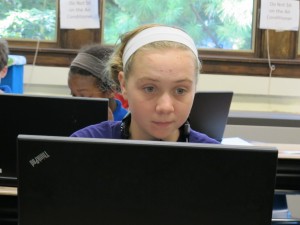How Indiana Officials Want To Take Smart Risks With Education Technology

Kyle Stokes / StateImpact Indiana
A seventh grader works in her class on a laptop owned by her school.
Introducing new, largely-untested technologies in the name of innovation is usually seen as the business of schools and corporations, not state officials.
The Indiana Department of Education, though, has ventured off the traditional turf over the past three years, offering grants to schools and districts who’ve sought ways to integrate new technologies in their classrooms.
Positioning Indiana as an education technology incubator has required the IDOE to take some risks — including on especially new methods and technologies that don’t have research backing them yet.
Since 2009, the Indiana Department of Education has issued four annual rounds of Classroom Innovation Grants — this year, they issued $4.3 million in grants to 22 schools or districts — to help fund the purchasing of SMART tables, iPads and tablets, mobile apps, and to help train staff to use them effectively in the classroom.
The grants are also supporting a pilot project in the Plymouth Community School Corporation to introduce the flipped classroom, in which teachers use online videos in place of in-class lectures.
John Keller, the Indiana Department of Education’s assistant superintendent for technology, tells StateImpact the Department has to walk a “fine line” between being on the leading edge and turning students into guinea pigs for new products.
Keller says, on one hand…
We do want to be seen as a place where innovation happens in schools. We want Indiana to be a place you can’t miss on the way to commercializing your product or service. We want to find out if it’s working.
…and on the other…
We would sponsor [new technologies] if we felt it had a reasonable chance of being successful. It’s important not to just try new things for new things’ sake, we have to understand what we’re trying to accomplish… I’m a believer in what’s examined improves. You don’t just snap your fingers and say, we’re going to do the flipped classroom, next subject. You have to say, what does it take to do this?
For a traditionally “conservative, risk-averse” organization like a Department of Education, Keller says that’s a difficult balancing act to undertake, especially because state officials “don’t want to be so cautious that [they] miss opportunities.”
And Keller says state officials are closely examining student test scores and performance metrics in classrooms where new technologies are introduced — “What’s examined, improves,” Keller says.


